The Ethical Landscape of Search Engines and Social Media
VerifiedAdded on 2021/05/30
|9
|1787
|296
Essay
AI Summary
This essay delves into the ethical considerations surrounding search engines and social media platforms. It examines key issues such as non-transparency, privacy consent, monitoring and surveillance, moral accountability, censorship, and cybersecurity. The essay discusses the digital footprint, the importance of protecting user data, and the potential for misuse of information. It also highlights the role of social media in shaping public opinion and the need for platforms to combat the spread of misinformation and promote societal sustainability. Furthermore, the essay provides recommendations for addressing ethical concerns, including avoiding digital footprints, ensuring neutrality, and preventing information manipulation. The conclusion emphasizes the need for search engines and social media to prioritize ethical practices and user well-being over profit, ensuring that these technologies remain sustainable and beneficial for society.
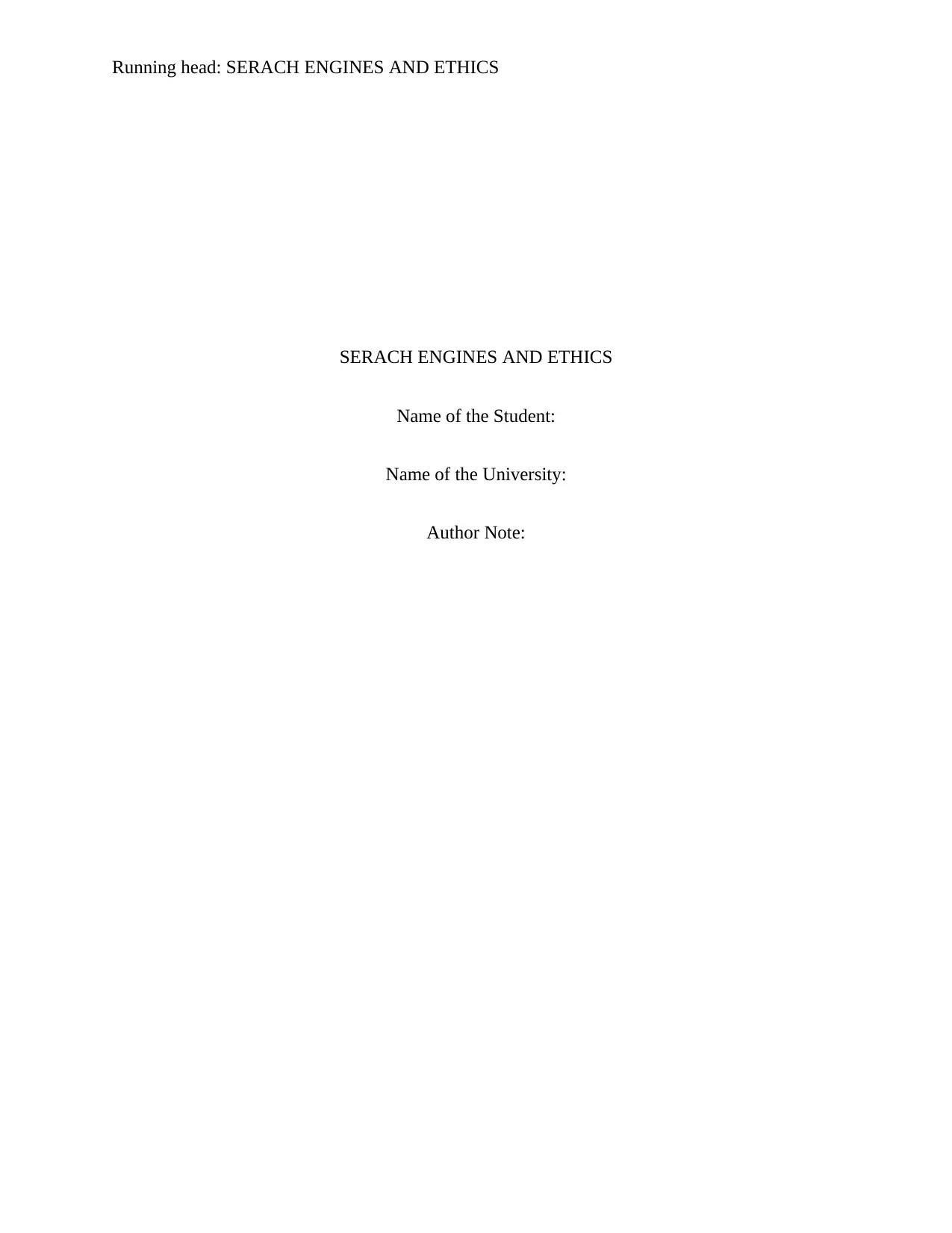
Running head: SERACH ENGINES AND ETHICS
SERACH ENGINES AND ETHICS
Name of the Student:
Name of the University:
Author Note:
SERACH ENGINES AND ETHICS
Name of the Student:
Name of the University:
Author Note:
Paraphrase This Document
Need a fresh take? Get an instant paraphrase of this document with our AI Paraphraser
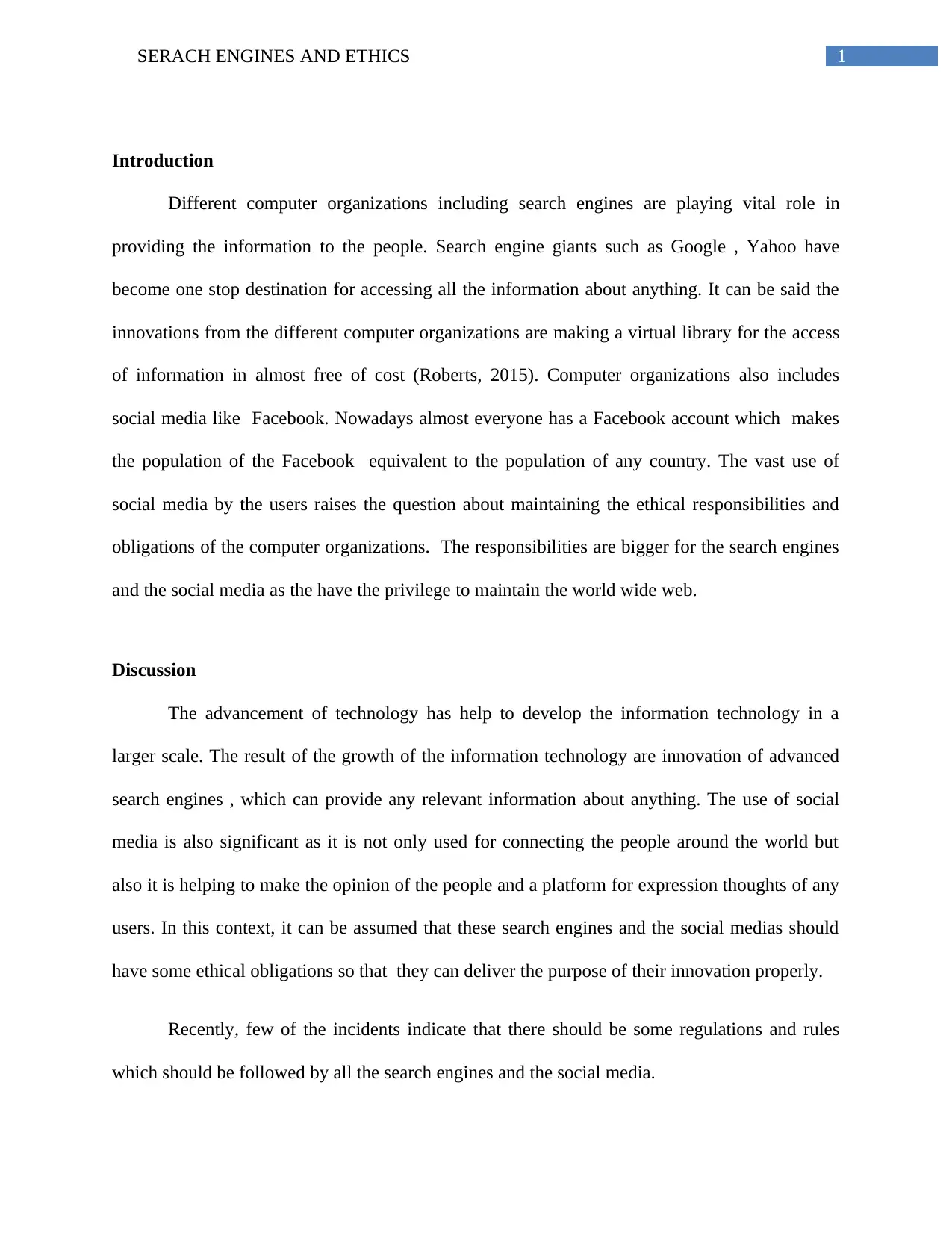
1SERACH ENGINES AND ETHICS
Introduction
Different computer organizations including search engines are playing vital role in
providing the information to the people. Search engine giants such as Google , Yahoo have
become one stop destination for accessing all the information about anything. It can be said the
innovations from the different computer organizations are making a virtual library for the access
of information in almost free of cost (Roberts, 2015). Computer organizations also includes
social media like Facebook. Nowadays almost everyone has a Facebook account which makes
the population of the Facebook equivalent to the population of any country. The vast use of
social media by the users raises the question about maintaining the ethical responsibilities and
obligations of the computer organizations. The responsibilities are bigger for the search engines
and the social media as the have the privilege to maintain the world wide web.
Discussion
The advancement of technology has help to develop the information technology in a
larger scale. The result of the growth of the information technology are innovation of advanced
search engines , which can provide any relevant information about anything. The use of social
media is also significant as it is not only used for connecting the people around the world but
also it is helping to make the opinion of the people and a platform for expression thoughts of any
users. In this context, it can be assumed that these search engines and the social medias should
have some ethical obligations so that they can deliver the purpose of their innovation properly.
Recently, few of the incidents indicate that there should be some regulations and rules
which should be followed by all the search engines and the social media.
Introduction
Different computer organizations including search engines are playing vital role in
providing the information to the people. Search engine giants such as Google , Yahoo have
become one stop destination for accessing all the information about anything. It can be said the
innovations from the different computer organizations are making a virtual library for the access
of information in almost free of cost (Roberts, 2015). Computer organizations also includes
social media like Facebook. Nowadays almost everyone has a Facebook account which makes
the population of the Facebook equivalent to the population of any country. The vast use of
social media by the users raises the question about maintaining the ethical responsibilities and
obligations of the computer organizations. The responsibilities are bigger for the search engines
and the social media as the have the privilege to maintain the world wide web.
Discussion
The advancement of technology has help to develop the information technology in a
larger scale. The result of the growth of the information technology are innovation of advanced
search engines , which can provide any relevant information about anything. The use of social
media is also significant as it is not only used for connecting the people around the world but
also it is helping to make the opinion of the people and a platform for expression thoughts of any
users. In this context, it can be assumed that these search engines and the social medias should
have some ethical obligations so that they can deliver the purpose of their innovation properly.
Recently, few of the incidents indicate that there should be some regulations and rules
which should be followed by all the search engines and the social media.
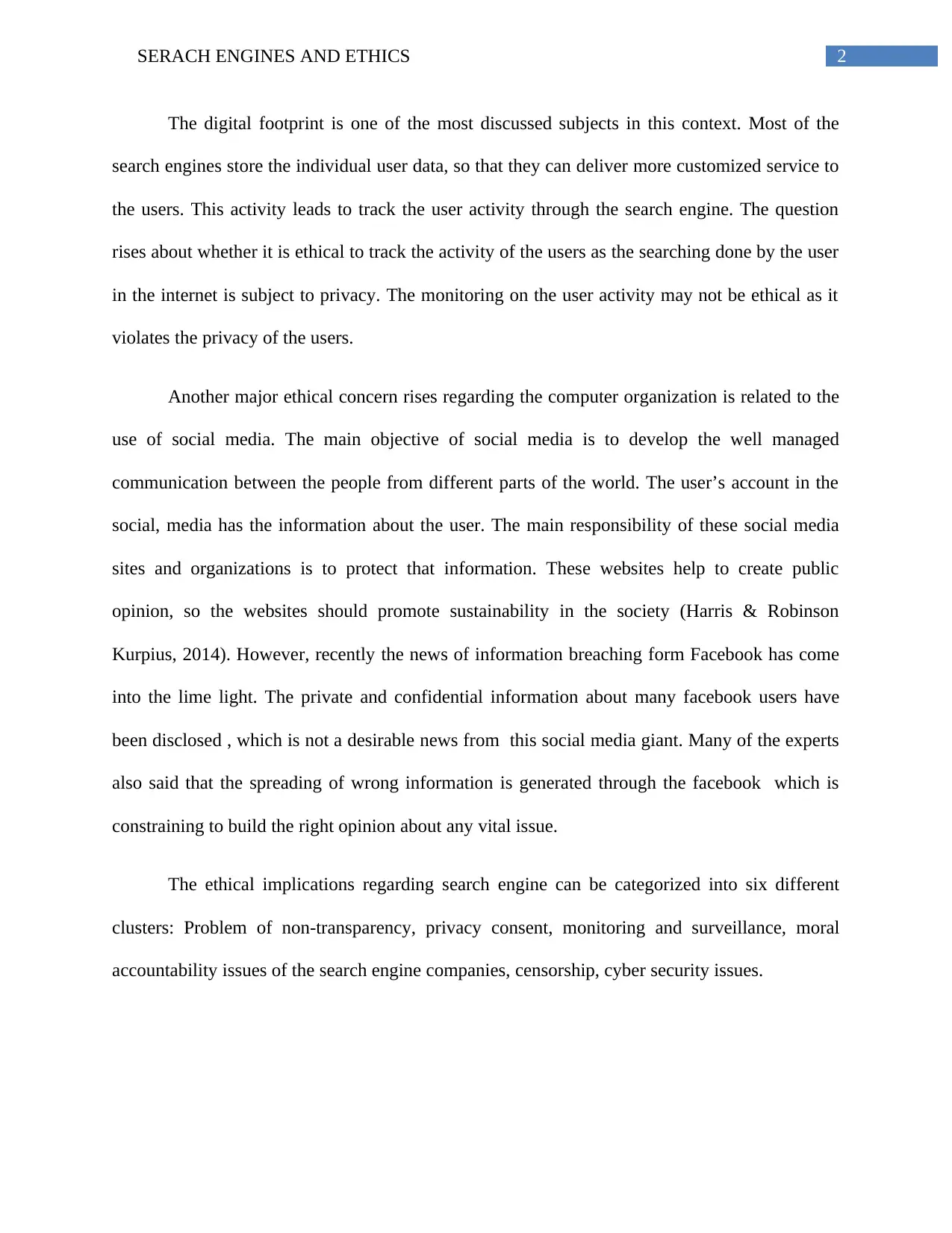
2SERACH ENGINES AND ETHICS
The digital footprint is one of the most discussed subjects in this context. Most of the
search engines store the individual user data, so that they can deliver more customized service to
the users. This activity leads to track the user activity through the search engine. The question
rises about whether it is ethical to track the activity of the users as the searching done by the user
in the internet is subject to privacy. The monitoring on the user activity may not be ethical as it
violates the privacy of the users.
Another major ethical concern rises regarding the computer organization is related to the
use of social media. The main objective of social media is to develop the well managed
communication between the people from different parts of the world. The user’s account in the
social, media has the information about the user. The main responsibility of these social media
sites and organizations is to protect that information. These websites help to create public
opinion, so the websites should promote sustainability in the society (Harris & Robinson
Kurpius, 2014). However, recently the news of information breaching form Facebook has come
into the lime light. The private and confidential information about many facebook users have
been disclosed , which is not a desirable news from this social media giant. Many of the experts
also said that the spreading of wrong information is generated through the facebook which is
constraining to build the right opinion about any vital issue.
The ethical implications regarding search engine can be categorized into six different
clusters: Problem of non-transparency, privacy consent, monitoring and surveillance, moral
accountability issues of the search engine companies, censorship, cyber security issues.
The digital footprint is one of the most discussed subjects in this context. Most of the
search engines store the individual user data, so that they can deliver more customized service to
the users. This activity leads to track the user activity through the search engine. The question
rises about whether it is ethical to track the activity of the users as the searching done by the user
in the internet is subject to privacy. The monitoring on the user activity may not be ethical as it
violates the privacy of the users.
Another major ethical concern rises regarding the computer organization is related to the
use of social media. The main objective of social media is to develop the well managed
communication between the people from different parts of the world. The user’s account in the
social, media has the information about the user. The main responsibility of these social media
sites and organizations is to protect that information. These websites help to create public
opinion, so the websites should promote sustainability in the society (Harris & Robinson
Kurpius, 2014). However, recently the news of information breaching form Facebook has come
into the lime light. The private and confidential information about many facebook users have
been disclosed , which is not a desirable news from this social media giant. Many of the experts
also said that the spreading of wrong information is generated through the facebook which is
constraining to build the right opinion about any vital issue.
The ethical implications regarding search engine can be categorized into six different
clusters: Problem of non-transparency, privacy consent, monitoring and surveillance, moral
accountability issues of the search engine companies, censorship, cyber security issues.
⊘ This is a preview!⊘
Do you want full access?
Subscribe today to unlock all pages.

Trusted by 1+ million students worldwide
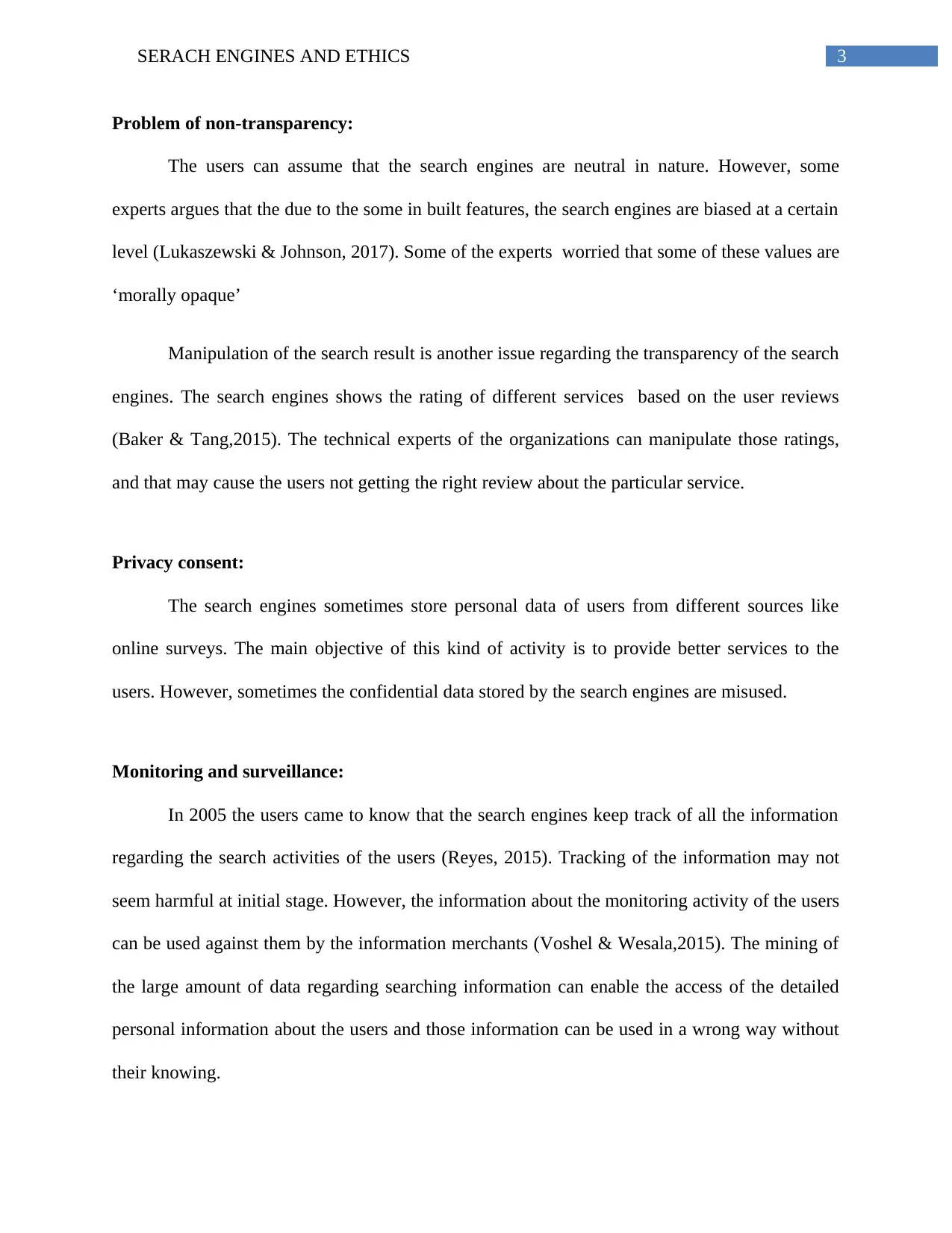
3SERACH ENGINES AND ETHICS
Problem of non-transparency:
The users can assume that the search engines are neutral in nature. However, some
experts argues that the due to the some in built features, the search engines are biased at a certain
level (Lukaszewski & Johnson, 2017). Some of the experts worried that some of these values are
‘morally opaque’
Manipulation of the search result is another issue regarding the transparency of the search
engines. The search engines shows the rating of different services based on the user reviews
(Baker & Tang,2015). The technical experts of the organizations can manipulate those ratings,
and that may cause the users not getting the right review about the particular service.
Privacy consent:
The search engines sometimes store personal data of users from different sources like
online surveys. The main objective of this kind of activity is to provide better services to the
users. However, sometimes the confidential data stored by the search engines are misused.
Monitoring and surveillance:
In 2005 the users came to know that the search engines keep track of all the information
regarding the search activities of the users (Reyes, 2015). Tracking of the information may not
seem harmful at initial stage. However, the information about the monitoring activity of the users
can be used against them by the information merchants (Voshel & Wesala,2015). The mining of
the large amount of data regarding searching information can enable the access of the detailed
personal information about the users and those information can be used in a wrong way without
their knowing.
Problem of non-transparency:
The users can assume that the search engines are neutral in nature. However, some
experts argues that the due to the some in built features, the search engines are biased at a certain
level (Lukaszewski & Johnson, 2017). Some of the experts worried that some of these values are
‘morally opaque’
Manipulation of the search result is another issue regarding the transparency of the search
engines. The search engines shows the rating of different services based on the user reviews
(Baker & Tang,2015). The technical experts of the organizations can manipulate those ratings,
and that may cause the users not getting the right review about the particular service.
Privacy consent:
The search engines sometimes store personal data of users from different sources like
online surveys. The main objective of this kind of activity is to provide better services to the
users. However, sometimes the confidential data stored by the search engines are misused.
Monitoring and surveillance:
In 2005 the users came to know that the search engines keep track of all the information
regarding the search activities of the users (Reyes, 2015). Tracking of the information may not
seem harmful at initial stage. However, the information about the monitoring activity of the users
can be used against them by the information merchants (Voshel & Wesala,2015). The mining of
the large amount of data regarding searching information can enable the access of the detailed
personal information about the users and those information can be used in a wrong way without
their knowing.
Paraphrase This Document
Need a fresh take? Get an instant paraphrase of this document with our AI Paraphraser
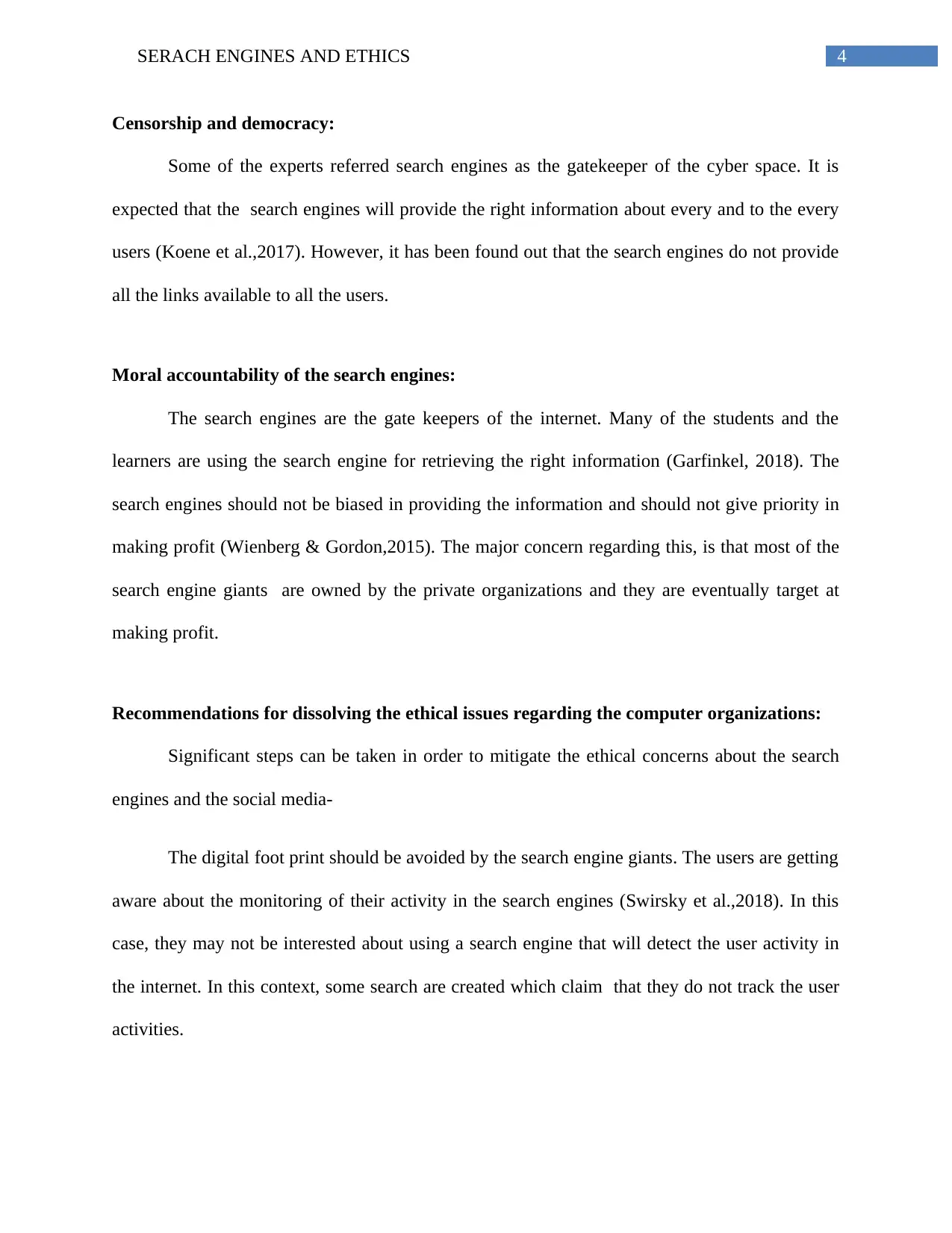
4SERACH ENGINES AND ETHICS
Censorship and democracy:
Some of the experts referred search engines as the gatekeeper of the cyber space. It is
expected that the search engines will provide the right information about every and to the every
users (Koene et al.,2017). However, it has been found out that the search engines do not provide
all the links available to all the users.
Moral accountability of the search engines:
The search engines are the gate keepers of the internet. Many of the students and the
learners are using the search engine for retrieving the right information (Garfinkel, 2018). The
search engines should not be biased in providing the information and should not give priority in
making profit (Wienberg & Gordon,2015). The major concern regarding this, is that most of the
search engine giants are owned by the private organizations and they are eventually target at
making profit.
Recommendations for dissolving the ethical issues regarding the computer organizations:
Significant steps can be taken in order to mitigate the ethical concerns about the search
engines and the social media-
The digital foot print should be avoided by the search engine giants. The users are getting
aware about the monitoring of their activity in the search engines (Swirsky et al.,2018). In this
case, they may not be interested about using a search engine that will detect the user activity in
the internet. In this context, some search are created which claim that they do not track the user
activities.
Censorship and democracy:
Some of the experts referred search engines as the gatekeeper of the cyber space. It is
expected that the search engines will provide the right information about every and to the every
users (Koene et al.,2017). However, it has been found out that the search engines do not provide
all the links available to all the users.
Moral accountability of the search engines:
The search engines are the gate keepers of the internet. Many of the students and the
learners are using the search engine for retrieving the right information (Garfinkel, 2018). The
search engines should not be biased in providing the information and should not give priority in
making profit (Wienberg & Gordon,2015). The major concern regarding this, is that most of the
search engine giants are owned by the private organizations and they are eventually target at
making profit.
Recommendations for dissolving the ethical issues regarding the computer organizations:
Significant steps can be taken in order to mitigate the ethical concerns about the search
engines and the social media-
The digital foot print should be avoided by the search engine giants. The users are getting
aware about the monitoring of their activity in the search engines (Swirsky et al.,2018). In this
case, they may not be interested about using a search engine that will detect the user activity in
the internet. In this context, some search are created which claim that they do not track the user
activities.
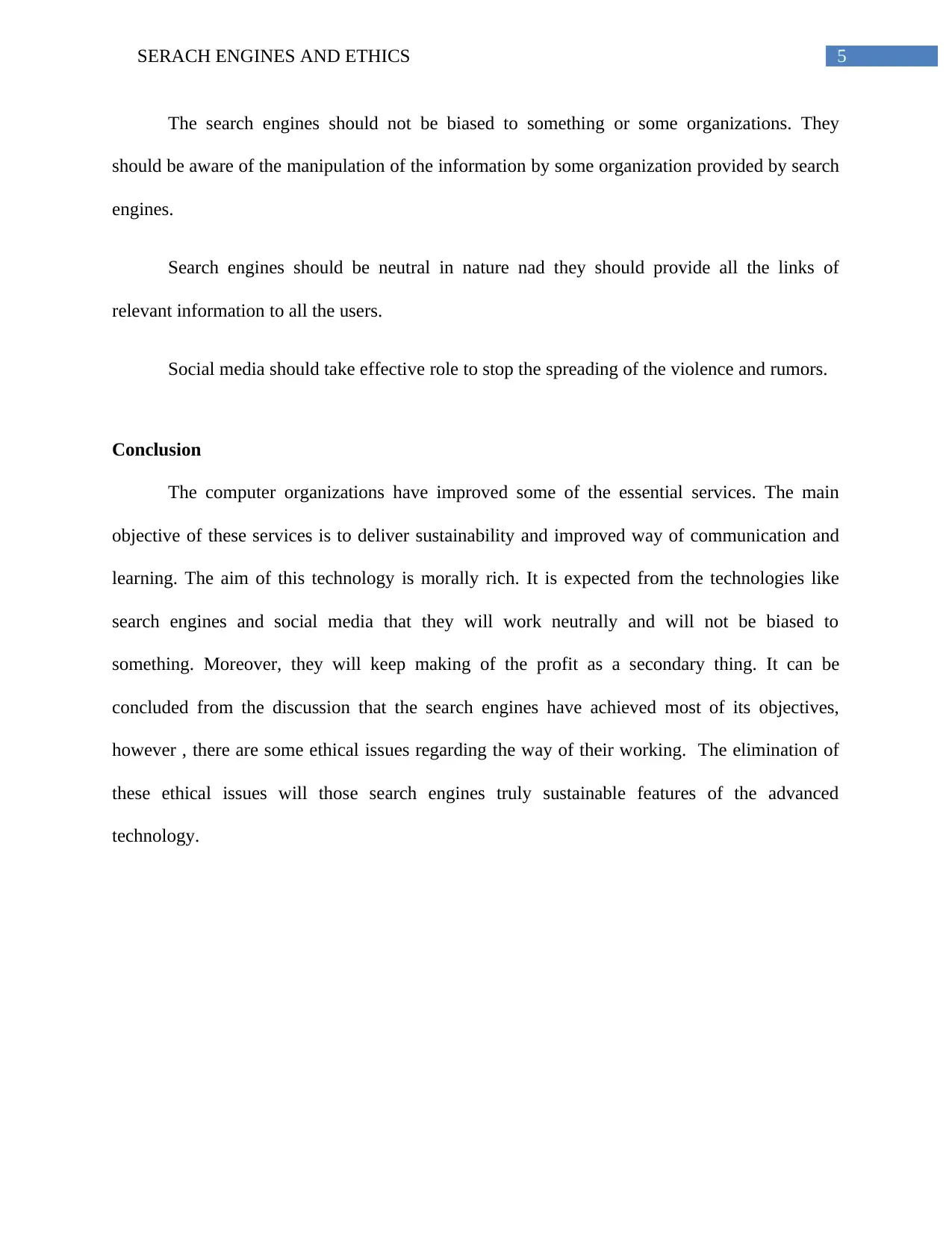
5SERACH ENGINES AND ETHICS
The search engines should not be biased to something or some organizations. They
should be aware of the manipulation of the information by some organization provided by search
engines.
Search engines should be neutral in nature nad they should provide all the links of
relevant information to all the users.
Social media should take effective role to stop the spreading of the violence and rumors.
Conclusion
The computer organizations have improved some of the essential services. The main
objective of these services is to deliver sustainability and improved way of communication and
learning. The aim of this technology is morally rich. It is expected from the technologies like
search engines and social media that they will work neutrally and will not be biased to
something. Moreover, they will keep making of the profit as a secondary thing. It can be
concluded from the discussion that the search engines have achieved most of its objectives,
however , there are some ethical issues regarding the way of their working. The elimination of
these ethical issues will those search engines truly sustainable features of the advanced
technology.
The search engines should not be biased to something or some organizations. They
should be aware of the manipulation of the information by some organization provided by search
engines.
Search engines should be neutral in nature nad they should provide all the links of
relevant information to all the users.
Social media should take effective role to stop the spreading of the violence and rumors.
Conclusion
The computer organizations have improved some of the essential services. The main
objective of these services is to deliver sustainability and improved way of communication and
learning. The aim of this technology is morally rich. It is expected from the technologies like
search engines and social media that they will work neutrally and will not be biased to
something. Moreover, they will keep making of the profit as a secondary thing. It can be
concluded from the discussion that the search engines have achieved most of its objectives,
however , there are some ethical issues regarding the way of their working. The elimination of
these ethical issues will those search engines truly sustainable features of the advanced
technology.
⊘ This is a preview!⊘
Do you want full access?
Subscribe today to unlock all pages.

Trusted by 1+ million students worldwide
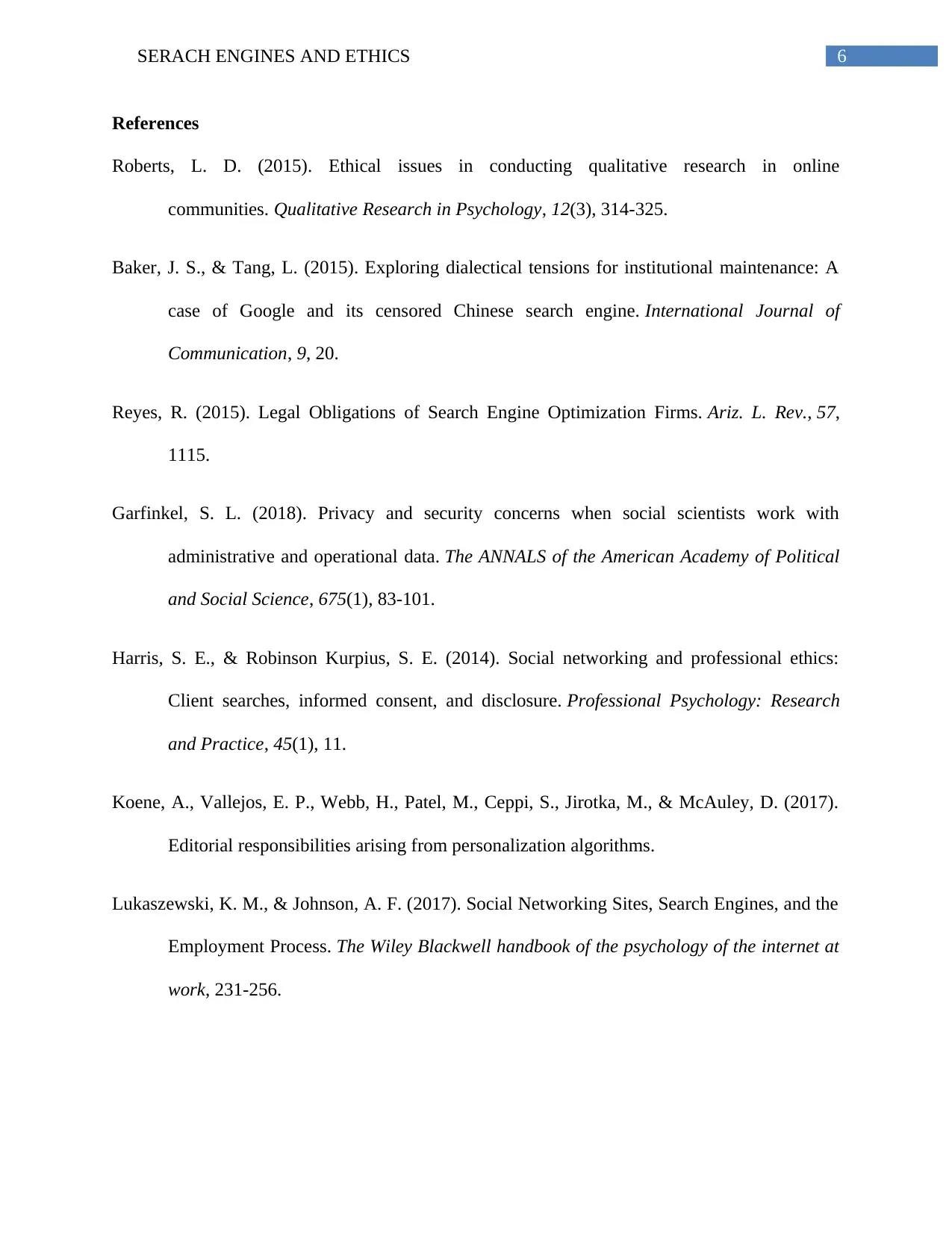
6SERACH ENGINES AND ETHICS
References
Roberts, L. D. (2015). Ethical issues in conducting qualitative research in online
communities. Qualitative Research in Psychology, 12(3), 314-325.
Baker, J. S., & Tang, L. (2015). Exploring dialectical tensions for institutional maintenance: A
case of Google and its censored Chinese search engine. International Journal of
Communication, 9, 20.
Reyes, R. (2015). Legal Obligations of Search Engine Optimization Firms. Ariz. L. Rev., 57,
1115.
Garfinkel, S. L. (2018). Privacy and security concerns when social scientists work with
administrative and operational data. The ANNALS of the American Academy of Political
and Social Science, 675(1), 83-101.
Harris, S. E., & Robinson Kurpius, S. E. (2014). Social networking and professional ethics:
Client searches, informed consent, and disclosure. Professional Psychology: Research
and Practice, 45(1), 11.
Koene, A., Vallejos, E. P., Webb, H., Patel, M., Ceppi, S., Jirotka, M., & McAuley, D. (2017).
Editorial responsibilities arising from personalization algorithms.
Lukaszewski, K. M., & Johnson, A. F. (2017). Social Networking Sites, Search Engines, and the
Employment Process. The Wiley Blackwell handbook of the psychology of the internet at
work, 231-256.
References
Roberts, L. D. (2015). Ethical issues in conducting qualitative research in online
communities. Qualitative Research in Psychology, 12(3), 314-325.
Baker, J. S., & Tang, L. (2015). Exploring dialectical tensions for institutional maintenance: A
case of Google and its censored Chinese search engine. International Journal of
Communication, 9, 20.
Reyes, R. (2015). Legal Obligations of Search Engine Optimization Firms. Ariz. L. Rev., 57,
1115.
Garfinkel, S. L. (2018). Privacy and security concerns when social scientists work with
administrative and operational data. The ANNALS of the American Academy of Political
and Social Science, 675(1), 83-101.
Harris, S. E., & Robinson Kurpius, S. E. (2014). Social networking and professional ethics:
Client searches, informed consent, and disclosure. Professional Psychology: Research
and Practice, 45(1), 11.
Koene, A., Vallejos, E. P., Webb, H., Patel, M., Ceppi, S., Jirotka, M., & McAuley, D. (2017).
Editorial responsibilities arising from personalization algorithms.
Lukaszewski, K. M., & Johnson, A. F. (2017). Social Networking Sites, Search Engines, and the
Employment Process. The Wiley Blackwell handbook of the psychology of the internet at
work, 231-256.
Paraphrase This Document
Need a fresh take? Get an instant paraphrase of this document with our AI Paraphraser
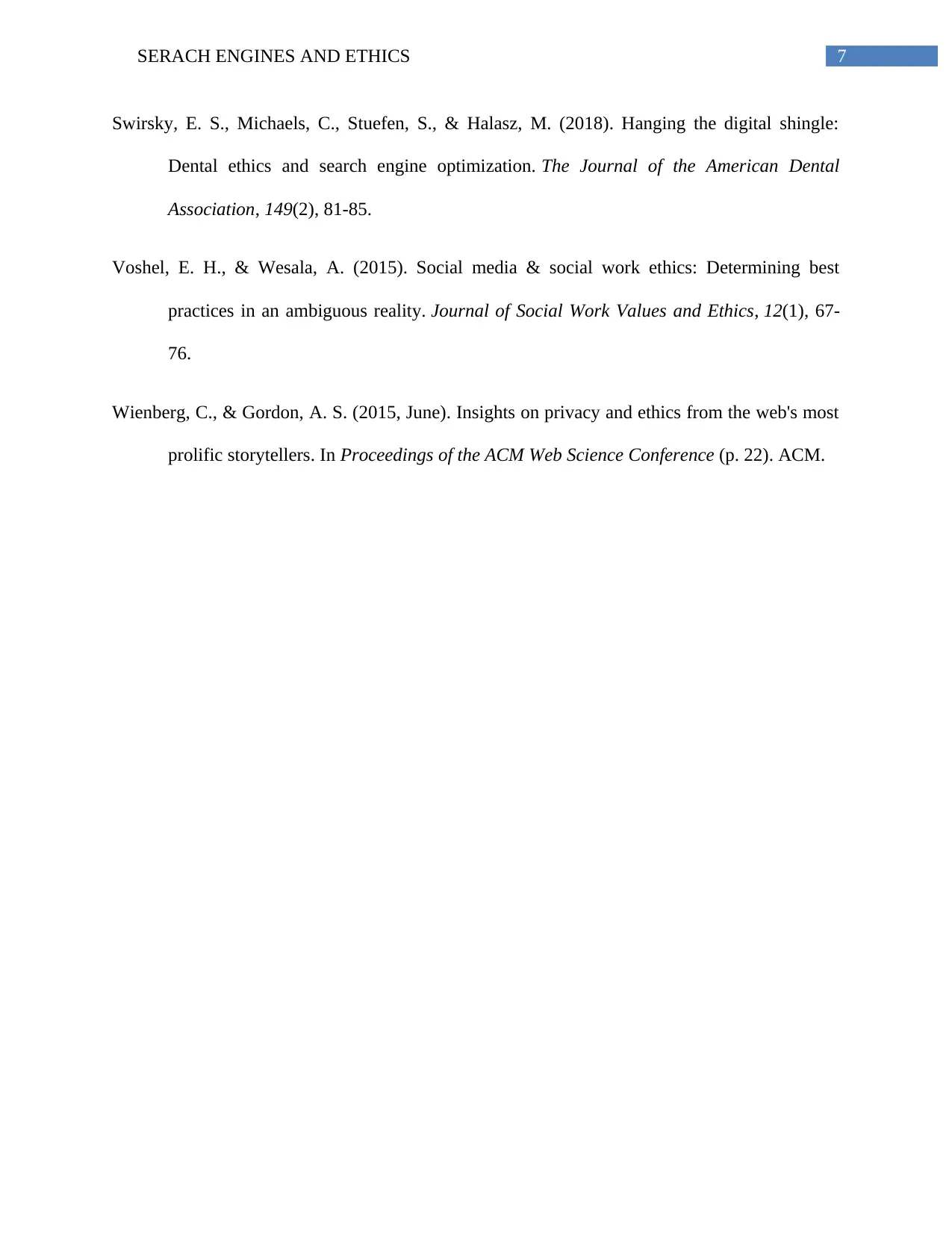
7SERACH ENGINES AND ETHICS
Swirsky, E. S., Michaels, C., Stuefen, S., & Halasz, M. (2018). Hanging the digital shingle:
Dental ethics and search engine optimization. The Journal of the American Dental
Association, 149(2), 81-85.
Voshel, E. H., & Wesala, A. (2015). Social media & social work ethics: Determining best
practices in an ambiguous reality. Journal of Social Work Values and Ethics, 12(1), 67-
76.
Wienberg, C., & Gordon, A. S. (2015, June). Insights on privacy and ethics from the web's most
prolific storytellers. In Proceedings of the ACM Web Science Conference (p. 22). ACM.
Swirsky, E. S., Michaels, C., Stuefen, S., & Halasz, M. (2018). Hanging the digital shingle:
Dental ethics and search engine optimization. The Journal of the American Dental
Association, 149(2), 81-85.
Voshel, E. H., & Wesala, A. (2015). Social media & social work ethics: Determining best
practices in an ambiguous reality. Journal of Social Work Values and Ethics, 12(1), 67-
76.
Wienberg, C., & Gordon, A. S. (2015, June). Insights on privacy and ethics from the web's most
prolific storytellers. In Proceedings of the ACM Web Science Conference (p. 22). ACM.

8SERACH ENGINES AND ETHICS
⊘ This is a preview!⊘
Do you want full access?
Subscribe today to unlock all pages.

Trusted by 1+ million students worldwide
1 out of 9
Related Documents
Your All-in-One AI-Powered Toolkit for Academic Success.
+13062052269
info@desklib.com
Available 24*7 on WhatsApp / Email
![[object Object]](/_next/static/media/star-bottom.7253800d.svg)
Unlock your academic potential
Copyright © 2020–2026 A2Z Services. All Rights Reserved. Developed and managed by ZUCOL.





